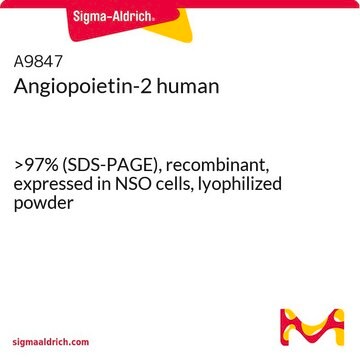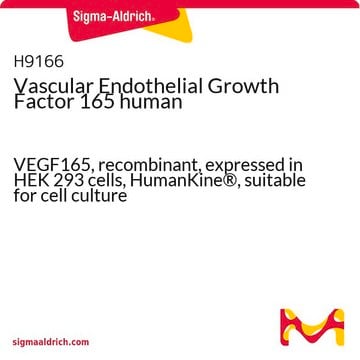GF165
ANG-2 Protein, Human Recombinant
Angiopoietin2 (Ang-2) is a secreted glycoprotein that plays a complex role in angiogenesis & inflammation.
Synonyme(s) :
ANG2, ANG, Angiopoietin 2, ANGPT2
Se connecterpour consulter vos tarifs contractuels et ceux de votre entreprise/organisme
About This Item
Code UNSPSC :
12352202
eCl@ss :
32160405
Nomenclature NACRES :
NA.77
Produits recommandés
Description générale
Angiopoietin2 (Ang-2) is a secreted glycoprotein that plays a complex role in angiogenesis and inflammation. Ang-2 is widely expressed during development, but it is restricted postnatally to highly angiogenic tissues such as the placenta, ovaries, and uterus. It is particularly abundant in vascular endothelial cells (EC) where it is stored in intracellular Weibel Palade bodies. ANG-2 binds to the endothelial cell specific receptor Tie2, but, in contrast to ANG-1 does not induce tyrosine phosphorylation. Consequently, ANG-2 modulates ANG-1 activation of Tie2 and, depending on the physiological and biochemical environment, can act either as a n agonist or antagonist of Tie2 induced angiogenesis. Physiologically, ANG-1 and ANG-2 are associated with sprouting, tube formation, and structural integrity of newly formed blood vessels. Mature human ANG-2 is a secreted protein containing 480 amino acid residues. ANG-2 is composed of an α helix rich “coiled coil” N-terminal domain and fibrinogen like C-terminal domain. ANG-2 exists predominantly in the form of a disulfide-linked dimer. Recombinant human ANG-2 is a C-terminal histidine tagged glycoprotein which migrates with an apparent molecular mass of 60.0 – 70.0 kDa by SDS-PAGE under reducing conditions. Sequencing analysis shows an N-terminal sequence starting with residue 68 (D) of the ANG-2 precursor protein.
Product Source: CHO Cells
Spécificité
Cross Reactivty
None
None
Application
Research Category
Stem Cell Research
Stem Cell Research
Research Sub Category
Growth Factors & Receptors
Growth Factors & Receptors
Qualité
Bioactivity assay: Determined by the dose-dependent stimulation of the proliferation of human umbilical vein endothelial cells (HUVEC). Bioactivity assay: Determined by its ability to stimulate tubulogenesis in HUVEC cells using a concentration of 0.2μg/ml.
Forme physique
Product is filtered through a 0.2 micron filter before lyophilization.
Stockage et stabilité
Store at -20°C for up to 6 months from date of receipt.
Clause de non-responsabilité
Unless otherwise stated in our catalog or other company documentation accompanying the product(s), our products are intended for research use only and are not to be used for any other purpose, which includes but is not limited to, unauthorized commercial uses, in vitro diagnostic uses, ex vivo or in vivo therapeutic uses or any type of consumption or application to humans or animals.
Code de la classe de stockage
11 - Combustible Solids
Classe de danger pour l'eau (WGK)
WGK 1
Certificats d'analyse (COA)
Recherchez un Certificats d'analyse (COA) en saisissant le numéro de lot du produit. Les numéros de lot figurent sur l'étiquette du produit après les mots "Lot" ou "Batch".
Déjà en possession de ce produit ?
Retrouvez la documentation relative aux produits que vous avez récemment achetés dans la Bibliothèque de documents.
Shihui Xu et al.
EBioMedicine, 86, 104312-104312 (2022-11-07)
The role of the IL6 family members in organ fibrosis, including renal interstitial fibrosis (TIF), has been widely explored. However, few studies have ever simultaneously examined them in the same cohort of patients. Besides, the role of leukemia inhibitory factor
Notre équipe de scientifiques dispose d'une expérience dans tous les secteurs de la recherche, notamment en sciences de la vie, science des matériaux, synthèse chimique, chromatographie, analyse et dans de nombreux autres domaines..
Contacter notre Service technique





